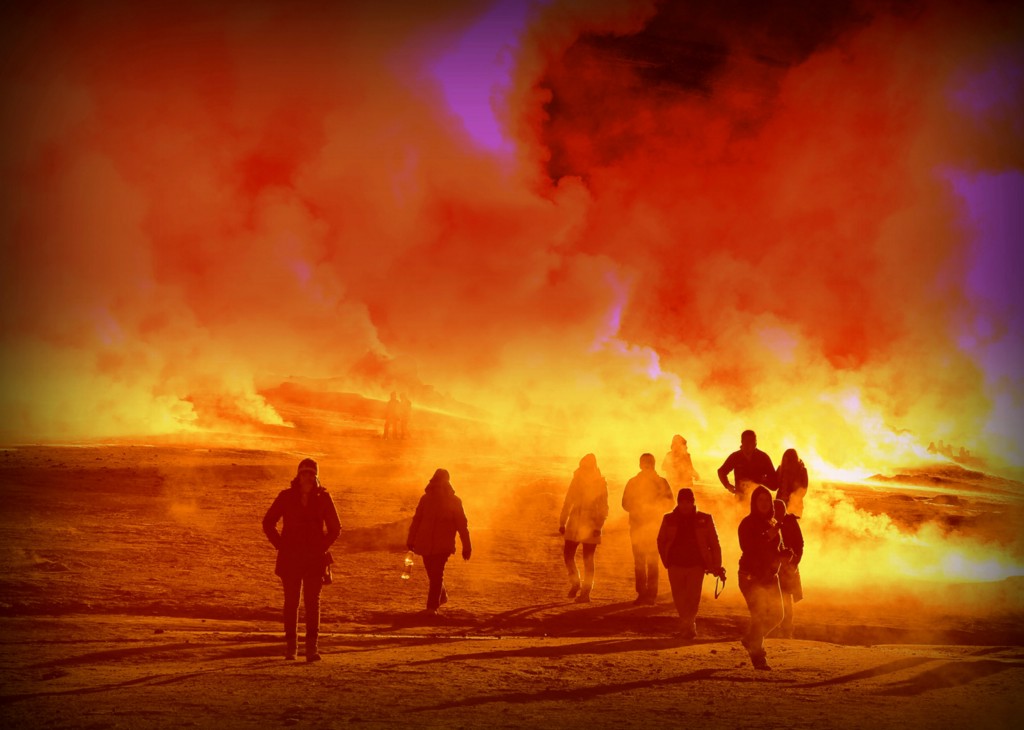news
This Twitter Thread About a Fashion Show is the Best Dystopian Novel We’ve Read in Ages
It’s like Station Eleven meets Project Runway

I n my secretest heartest of hearts,” artist Jared Pechacek wrote on Twitter, “I have thought that some couture collections look like something you’d put together to amuse the clan when, while foraging, you come across a collapsed mall from the Times Before.” Don’t believe him? He turned the A.F. Vandevorst’s spring 2018 collection into a tale of survival, suspicion, frantic attempts to build community and tradition, and fabulous clothes in a postapocalyptic wasteland.
Jared let us reprint his thread, which outlines the basic plot of his couture dystopia, but we can’t wait for the whole novel (and dare we think he’s hinting at a sequel?)
Like if you found the ruins of an Ann Taylor and a Burlington Coat Factory, and the Mother-Who-Remembers needed a laugh, this is what you'd do. And then her laughter would turn to coughing, but the water hasn't finished purifying, so you pat her back.
Don't laugh at her, she's just trying to stay warm as she sorts through fragments of neon tubes in the old food court, hoping something there is sharp enough to make a spear. For the Others are not far behind, the shamblemen, and she must move on.
She gently stripped the bodies-poor things they had no need of clothes no more-and shook out the dust. The plastic squares flapped, each holding a picture of a woman-old dead faces of the old dead world-and after a moment she decided to leave them on. To remember.
She found the rows of plastic torsos, some still in their frills. She undressed them and tried each garment on in turn, hoping one would fit. None did. She wore them all anyway, to take back to Mother-Who-Remembers and Mother-Who-Makes. There was use in them still.
The stranger only asked for hospitality, and the Sharing was still in effect-leastways, till they left the valley ruins and went along the cracked roads again-so they gave them some water and a dried, blighted apple.
It was not so hard to find medals. So many of the bodies had them, winking up at the cold closed sky. She liked to take them for decoration, and for trade: folk who remembered what the stars and birds stood for, those folk would weep and give her water.
They had not all seen so much color in days: the ash got everywhere, greyed everything, dulled eye and hair and sleeve. But sometimes one'd find a thing of surviving brightness, and one'd have to appreciate it quick, before the ash got to it.
There was only one mask in the group, & they shared it round. When it was your turn you'd have just long enough to get used to cleaner air, to wash out the dust & ash from your mouth, to stop coughing.
You could always improvise an air filter. But it was never perfect, and when you took it off there'd be a puff of particles. Some folk these days took to wearing scarves always, hiding their faces and eyes, blunting their sight and smell of the dead world.
You might sometimes see the Sisters, but it was always bad news. They could only spare a mercy for the dying, always the same sharp cruel kindness. So their coats were slick and easily cleaned, and their expressions the same.
It was an unspoken rule for some that you always leave the badges on. Bad enough to take from the dead, why disrespect their ghostly faces by forgetting them and their unintended gift?
The Sharing was the only real unbreakable rule, but even it was ignored if you came across someone who wouldn't show their real hands. Folk like that were protecting their skin for a reason, and that reason always hurt you.
It made a dim kind of sense to her that the navy of the old world would make clothes. After all, she'd find all manner of things among the military dead. And here was such a lot of faded denim (as Mother-Who-Makes called it) that she couldn't leave it behind, though it WAS heavy.
There was another stranger now, which was suspicious. At most you'd meet one other wanderer in a whole day of wandering, and now here were two, taking from the Sharing and not giving back. Mother-Who-Makes smiled, but kept a hand on her knife.
She watched the two strangers from outside the circle of firelight. She watched Mother-Who-Makes' suspicious smile and Mother-Who-Remembers' exhausted acceptance of whatever might come. Nobody could see her there in the shadows. She tightened her grip on a fallen brick & waited.
Now there was a third stranger, pale as the daytime sky, who smiled with her hands hidden and hoped you all were having as good an evening as could be wished, ma'ams, misses, mister. Just as good an evening as could be.
One could find parachutes of the fallen over the place. But here in the valley, where the volcano had made an end to the last battle of the last war, they were rare, and folk who found them made them into plumage and display.
They had found a room-half-caved in, like the rest of this place-full of giant stuffed animals like the worn bear Mother-Who-Remembers always carried. And they had liked that set of long ears, so they tore them off and put them on their head, and felt very fine.
Mother-Who-Remembers gasped, her resignation gone, as the fourth stranger appeared. They did not speak. They only pointed at the jugs of water, not purified but more precious than meat and iodine, and waited to be obeyed.
He was useless in a fight (for remembering, they kept him) but stood anyway when his sisters did. The two mothers, though, they sat, and Who-Makes put her arm around Who-Remembers. The sister in the dark lifted the brick in her hands and took aim.
The palest sister lifted her arm to show her badge. The strangers stiffened. "It used to mean medicine," she said, "but you know how it is these days." And instruments glittered between her fingers, blades and needles, help and hurt. "You can leave," she said, "or you can bleed.
From outside, the sister who always fed birds heard the commotion. She shut her eyes and willed herself to feel only those tiny sharp claws, hear those tiny soft voices, and imagine once again what birds might have looked like in the days when they were whole.
Mother-Who-Makes stood, letting Who-Remembers fall unheeded (her breath gone, but her scarves glittering), and her medals clinked as she readied her knife. She was ready, too: may as well end here as elsewhere. A brick whistled past her ear. The last and palest stranger fell.
They didn't call it a rite exactly-only Mother-Who-Remembered would've known to call it that-but they made up some flags, as the old world had, and the sisters who survived decided the carousel at the end of the food court would work for their purposes. So their parade began.










